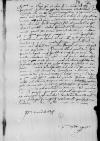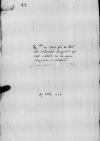Letter #1939
Ioannes DANTISCUS to Tiedemann GIESEHeilsberg (Lidzbark), 1538-10-10
English register:
Dantiscus takes it upon himself to deal with the banker [Georg Hegel] and get him to come to his senses. He is just sending a messenger to the royal court. As soon as the man returns, he will send Giese his dues.
The tailor will hand Giese the constitutions of the [Royal Prussian] Diet in Thorn (Toruń) and a cope delivered to Heilsberg (Lidzbark Warmiński) by mistake.
Dantiscus would be willing to fulfil Giese’s request regarding the Guttstadt (Dobre Miasto) canonry, but he has already given it to his own chaplain.
He sends back [Paul Speratus’] poem, which he considers to be of very poor quality.
The letter of appointment to the office of sword-bearer [for Felix von Allen (von Malden, Mełdzyński)] has not reached Dantiscus. He suggests approaching the scribes of the royal chancellery on the matter. He promises to mention it to the Dean of Cracow [Samuel Maciejowski], taking the opportunity to give Giese’s regards to him and [Nikolaus] Nibschitz (Nipszyc).
Dantiscus assures Giese he is not as gullible as some people suggest.
| received 1538-10-11 Manuscript sources:
Prints:
| ||||||
Text & apparatus & commentary Plain text Text & commentary Text & apparatus
Reverendissimo in Christo Patri et Domino, domino
Reverendissime in Christo Pater et Domine, frater et amice carissime et honorande.
Salutem et perpetui amoris commendationem.
Cum
Acta
Canonicatum Gutstatensem
Poema illud, quod suum sapit poetam, utpote neque pedibus, neque sensu constans, remitto. Concitavit mihi risum et non parvam admirationem, quod talia miser furore, sed non divino, afflatus
Litterae gladiferatus[2] ad me non pervenerunt. Petendae sunt pretio ex canc<e>llaria a scribis, commonebo tamen dominum
Plura addere multa ad curiam scriptio non sinit, hoc tamen velim sibi de me Dominatio Vestra Reverendissima persuadeat, quod adeo non sum facilis ad credendum in amicum cognitum, quemadmodum illi putant, qui cum aliquid commiserunt, nolunt, ut commissum esse credatur. Sententiam tenet Dominatio Vestra Reverendissima.
Quae diutissime felicissimeque valeat.
Ex
Reverendissimae Dominationi Vestrae deditissimus
[1 ] Unidentified poem by
[2 ] litterae gladiferatus for

